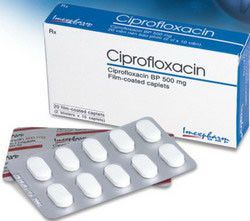Top Class Actions’s website and social media posts use affiliate links. If you make a purchase using such links, we may receive a commission, but it will not result in any additional charges to you. Please review our Affiliate Link Disclosure for more information.

Cipro, also known by its generic name ciprofloxacin, is one of six fluoroquinolone antibiotics now available in the U.S.
Other fluoroquinolones include Avelox (moxifloxacin), Factive (gemifloxacin), Floxin (ofloxacin), Levaquin and Noroxin (norfloxacin). All six fluoroquinolones have antibiotic side effects.
These drugs are broad-spectrum antibiotics frequently used to treat infections of the respiratory and urinary tract systems. Scientists believe these drugs work by disrupting the function of bacterial DNA, preventing bacteria from growing.
As a group, fluoroquinolones are the most widely used type of antibiotic in the U.S. Of the six fluoroquinolones, Cipro is the most widely prescribed.
Every year about 20 million U.S. patients take some form of Cipro. But despite Cipro’s popularity, recent research suggests Cipro side effects may include an increased risk of aortic aneurysm and aortic dissection.
Studies Investigate Cipro Side Effects
In one study, published in JAMA Internal Medicine in 2015, researchers examined the medical records of thousands of patients in Taiwan’s National Health Insurance Research Database.
To evaluate some of the antibiotic side effects associated with fluoroquinolones, they compared patients who had suffered aortic aneurysm or dissection to several others who hadn’t, and they noted whether the patients had current, past, or any prior-year use of fluoroquinolones such as Cipro.
The researchers found that both current and past users of fluoroquinolones were at roughly twice the risk for aortic aneurysm or dissection within 60 days of their exposure to fluoroquinolones.
While the researchers said the results did not establish a cause-and-effect relationship between fluoroquinolones and aortic injuries, they commented that in the absence of more definitive data, clinicians should watch out for signs of aortic aneurysm and dissection in high-risk patients taking fluoroquinolones.
Scientists theorize that the increased risk of aortic injury may stem from a detrimental effect on the protein collagen that Cipro and other fluoroquinolones may have.
Several collagen-related disorders like retinal detachment, degradation of tendons, and rupture of the Achilles tendon have been identified as possible antibiotic side effects of fluoroquinolones.
Researchers in the Taiwan study note that in addition to being a significant component of tendons, collagen is also a major component of the aortic wall.
They believe Cipro side effects may be degrading the collagen in the aortic wall, increasing the possibility of an aortic aneurysm or dissection.
Whatever the cause, these aortic injuries have recently been happening more frequently in the U.S. An estimated 15,000 people in the U.S. die every year from aortic aneurysm alone.
Both aortic aneurysm and dissection disrupt blood flow in the aorta, the large blood vessel that leads blood out from the heart to the rest of the body.
An aortic dissection is a tear in the wall of the aorta that allows blood to seep in between the layers of the aortic wall. It can stifle blood flow to organs, putting the patient at risk for any number of deadly complications like stroke or kidney failure.
In an aortic aneurysm, the wall of the aorta bulges outward. The bulge creates a dangerous weakness in the aortic wall. If that wall bursts, patients typically have even odds of survival.
If you experienced aortic complications after taking Cipro or other fluoroquinolones, you may have a legal claim.
In general, fluoroquinolone lawsuits are filed individually by each plaintiff and are not class actions.
Do YOU have a legal claim? Fill out the form on this page now for a free, immediate, and confidential case evaluation. The attorneys who work with Top Class Actions will contact you if you qualify to let you know if an individual lawsuit or class action lawsuit is best for you. Hurry — statutes of limitations may apply.
ATTORNEY ADVERTISING
Top Class Actions is a Proud Member of the American Bar Association
LEGAL INFORMATION IS NOT LEGAL ADVICE
Top Class Actions Legal Statement
©2008 – 2024 Top Class Actions® LLC
Various Trademarks held by their respective owners
This website is not intended for viewing or usage by European Union citizens.
Get Help – It’s Free
Join a Free Fluoroquinolone Aortic Aneurysm, Aortic Dissection Lawsuit Investigation
If you or a loved one were injured by a fluoroquinolone antibiotic aortic aneurysm or aortic dissection, you may have a legal claim. See if you qualify to pursue compensation and join a free fluoroquinolone class action lawsuit investigation by submitting your information for a free case evaluation.
An attorney will contact you if you qualify to discuss the details of your potential case.
Please Note: If you want to participate in this investigation, it is imperative that you reply to the law firm if they call or email you. Failing to do so may result in you not getting signed up as a client, if you qualify, or getting you dropped as a client.
Oops! We could not locate your form.












